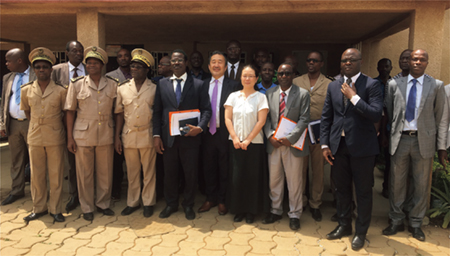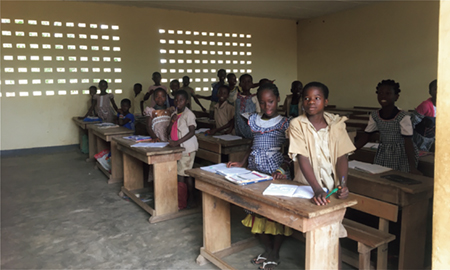Stories from the Field 09
Restoring People's Trust for Administration through Japan's Support for Moving Forward Together
– Capacity Building Project for Government Services in Côte d'Ivoire
Côte d'Ivoire is a West African country with a population of about 22.7 million that gained its independence from France in 1960. It is a major producer of cacao and natural rubber, and in the 1970s after independence the country's rapid economic growth earned it the moniker “Ivory Coast Miracle.” However, since the death of the country's first president and father of independence, Félix Houphouët-Boigny, in 1993, Côte d'Ivoire gradually followed a path of instability and by 2002 it had fallen into civil war for all intents and purposes. Thereafter, the country was divided into north and south over roughly ten-year period, resulting in repeated attempts towards peace and reconciliation in the midst of political upheaval.
During this time, Côte d'Ivoire suffered from declining government functions, and basic social services did not reach the people. At a time when the international community provided strong support for improving health, education and access to water in an effort to realize the Millennium Development Goals (MDGs), the people of Côte d'Ivoire affected by conflict had lost out on opportunities for development.
After the civil war ended in 2011, Côte d'Ivoire worked towards national reconciliation and social integration as well as reconstruction and development. During this time, there were major challenges such as improving the capacity to restore government functions and provide basic social services, restoring trust between people and the government, and reconciling at the community level torn apart during the conflict.

Commemorative photograph taken with the region's governor, department's governor, mayor of Gbeke and others after the final meeting of the project(Photo: Oriental Consultants Global Co., Ltd.)
JICA launched the “Project on Human Resource Development for Strengthening Local Administration in Central and Northern Areas of Cote d'Ivoire (PCN-CI)” in 2013, at the re-start of full-fledged cooperation. The project targeted the Gbeke Region, an area situated in the north central part of the country where the impacts of the civil war were still clearly evident. PCN-CI restored basic government services that essentially did not function over the previous 10 years together with the assistance of nine nearby departments and the Ministry of Interior (Internal Security), which have jurisdiction over local administration, and worked systematically on capacity building for sustaining local government. A pilot project was carried out for supplying villages with water, a high priority item for people's basic needs, and building elementary schools. The goal was to form participatory partnerships, including people's participation in planning, the effective use of facilities, and establishment of maintenance associations. At the time, however, there was a deep divide between the central and local government and the people and government in terms of trust. Thus, at first the project did not proceed as an ideal scenario.

A school built under the project and its students(Photo: Oriental Consultants Global Co., Ltd.)
Ms. Junko Okamoto, a Sub-leader of Oriental Consultants Co., Ltd. who has participated in the project locally as a Japanese expert since 2013, said the following about the initial response of project partners on the Cote d'Ivoire side, “Everyone including the region's governor had a passive attitude towards the project, and their interest was only when we would start building schools.” Ms. Okamoto adds, “However, the response completely changed as we achieved results little by little in the community and both government functions and trust were gradually restored.”
The project began with a detailed field study conducted locally together with administrative officials. This is because first the project had to identify what the people needed, what challenges they faced, and what projects should be given priority. To date, a field study of this kind had never been conducted locally, and therefore, even when various projects were implemented, most did not meet the needs of the local people. The results of the study and prioritization of projects were explained carefully to the people, including village representatives comprising the local authorities, and as a result, people's trust in the government was gradually restored as well.
The pilot project aimed at building water supply facilities and constructing schools was implemented each and every step together with local administrative officials. In this manner, the project went through the correct process with them, including surveying the actual situation, selecting the top-priority project, formulating a development plan, receiving bids for project implementation, and executing construction management. As a result, we practically transformed this know-how to them.
This project, which lasted from November 2013 to April 2017, extended or renovated 11 elementary schools and constructed or repaired water supply facilities at 78 locations. While it is important to ensure that these facilities are actually being used by the local people who need them, at the same time, other great achievements of the project included helping to restore government functions, wipe away people's distrust of government, and restore cooperation among people and between people and the government.
Even the region's governor, who initially only showed interest in facility construction, began to state the need for local people to take the initiative and not only rely on others.
This demonstrates that Japan's assistance based on working together is beginning to take root in Côte d'Ivoire.
<< Previous Page Next Page >>
Main Text | Statistics and Reference Materials | Stories from the Field | Master Techniques from Japan to the World | ODA Topics
